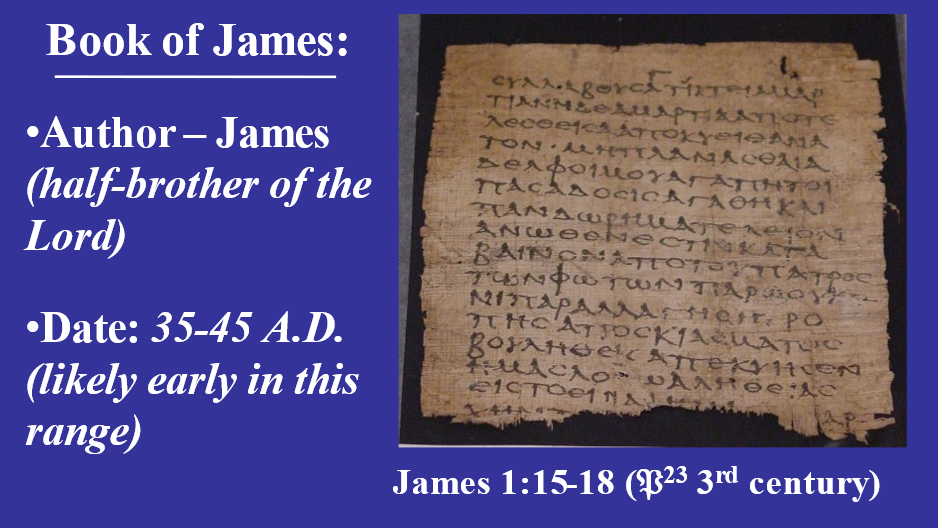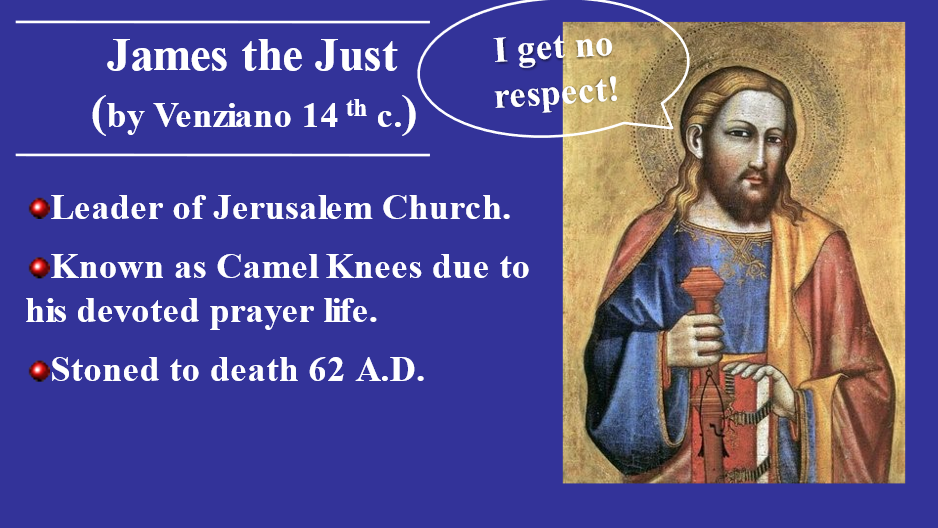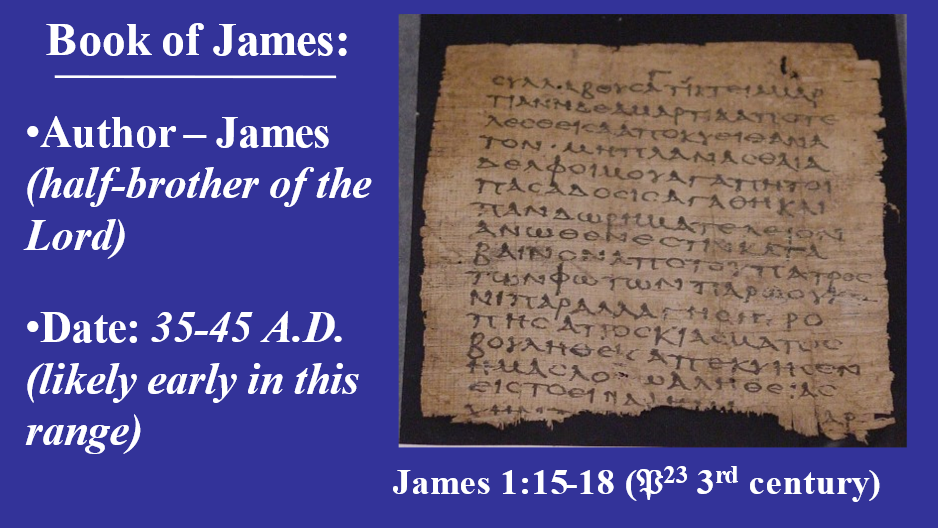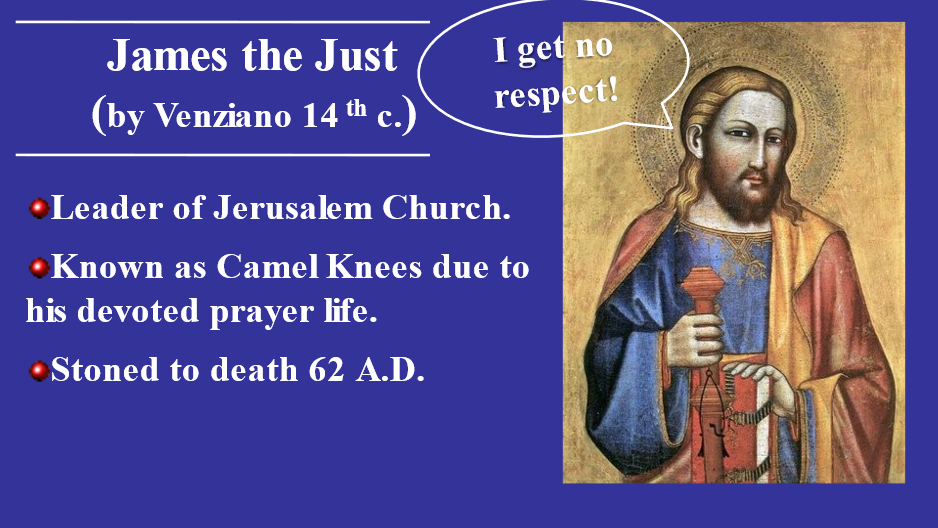The Book of James: God’s masterpiece lives.
Tuesday February 28, 2023
Book of James:
Author – James (half-brother of the Lord)
Date – 35-45 A.D. (likely early in this range)

Probably the most important thing to know about the background of this epistle is when it was written. We can say with good confidence that it was the first New Testament book written. What is less certain is where in the range of A.D. 34-50 that it was written.
Some of the things in the book make more sense if the date is very early, which is why I favor a date of 35ish, but that can ever be only opinion. The main theme of the book is not changed by the date, but some things that are head scratchers, the very things that led some in the early church not to include James in what they thought was the canon, are cleared up by understanding the early date of writing.
Martin Luther did not include it among the “chief proper books”; compared to them, he thought it a “right strawy epistle.” Since it contained “may a good saying,” however, it could be read with profit (German Bible, 1522). Luther disliked James because he thought it contradicted Paul’s teaching on faith-righteousness and because it did not have any “gospel character,” that is, did not “show thee Christ.”

However, James’ writing becomes clear when the earlier date theory is known. If he is writing before Paul was even converted and before any appreciable number of Gentiles had become a part of the church and before any theology had been developed, he would not have himself developed any of these and addressed his letter to Jews. Believers, by far mostly Jewish, were still trying to grasp all of what had occurred when Christ died, rose, and ascended into heaven.
What James did understand is that the new creation in Christ was called to holiness, and Jesus’ Sermon on the Mount told all of them that they were to be as holy as heaven, as sacrificial and loving as Himself, and acting upon the things that they heard. In fact, there are multiple parallel passages between James and the Sermon on the Mount in Matthew.
The author is James, the half-brother of Jesus. He didn’t become a believer until after the resurrection. This means that he’s only been a believer for maybe two years, yet he is the leader of the Jerusalem church, and he shows in his letter that he knows he has authority in this position. Sources outside the Bible [historians] reveal that he was well respected, earning the title James the Just and also “Camel Knees” on account of his frequent prayer on his knees. He was arrested for violation of the Law and was stoned to death in Jerusalem in 62 A.D. by the command of the high priest.

Jam 1:1
James, a bond-servant of God and of the Lord Jesus Christ,
To the twelve tribes who are dispersed abroad: Greetings.
This dispersion could very well be the very first under the direction of the church’s greatest hater.
Act 8:1-3
Saul was in hearty agreement with putting him to death.
And on that day a great persecution began against the church in Jerusalem, and they were all scattered throughout the regions of Judea and Samaria, except the apostles. 2 Some devout men buried Stephen, and made loud lamentation over him. 3 But Saul began ravaging the church, entering house after house, and dragging off men and women, he would put them in prison.
It’s wonderful to be able to look back at church history and see God working. This evil, religious man (according to him, the worse sinner who ever lived) caused a diaspora to whom James would write, from whom James’ own life would have been threatened, but then later becomes a believer to write the fully developed theology of the very things that James spent his born-again life teaching.
Jam 1:1
James, a bond-servant of God and of the Lord Jesus Christ,
To the twelve tribes who are dispersed abroad: Greetings.
Dispersed is the same word used by Luke in Act 8:1, “scattered.”
And, if the early date is correct, the recipients, “the twelve tribes who are scattered,” would be a term for believers of the time. No appreciable number of Gentiles had been a part of the church yet. And as we look into the Book of Acts, we see that in the first years, believers, all of whom were Jews, were confused about Gentiles entering the church. Until Paul’s work in the Gentile regions, and Peter’s calling to go to Cornelius’ house, the Jewish believers did not yet see the church as being distinct from Israel (read: Act 11, 15).
If this is the reason, then why not address the letter to something like “my brethren” or “the churches.” It may be that James wanted to impress unity upon them at the start, which is an issue that he will address in the letter. The twelve tribes were always to act together as one.
Other helps that the early date gives us:
It explains why there is no developed theology or Christology.
If the early date is true, then not enough time had gone by from the death of Christ for anyone to be contemplating and understanding systems of truths concerning salvation, the Person and work of Christ, His deity, what the church was, etc.
It should not surprise us that the infant church experienced this persecution. And it was not only the religious leadership of Israel – Satan has many schemes, and I’m sure that when he started to realize something of what the resurrected Christ created, right under the nose of the god of this world, he set to work in any way he could think of to destroy it. The it was the church. The Lord of course was several steps ahead of him, and the Lord’s solution was to train leaders, apostles and men such as James the Just, to instruct, exhort, reprove, and encourage the new creation in Christ.
Being the first New Testament book written, and likely written very early on, God was showing us that obeying and doing was first and foremost for believers if they were going to survive, i.e., live and not die. Faith without works is a killer of life.
Jam 1:2-4
Consider it all joy, my brethren, when you encounter various trials, 3 knowing that the testing of your faith produces endurance. 4 And let endurance have its perfect result, so that you may be perfect and complete, lacking in nothing.
The words “Consider it all joy” is the real opening of this letter.
“They strike precisely the note of triumph that James wishes to sound for his Christian brothers.” [Zane Hodges, The Epistle of James]
Their trials tested their faith in God’s providence as well as their faith is who God had made them to be.
This is truly what James writes.
Quality-proven faith (which has to undergo trial to prove itself) produces endurance, which makes mature Christians.

Jam 1:2-4
Consider it all joy, my brethren, when you encounter various trials, 3 knowing that the testing of your faith produces endurance. 4 And let endurance have its perfect result, so that you may be perfect and complete, lacking in nothing.
The phrase “testing of your faith” means that the quality of your faith is being tested. We could almost treat the word “testing” [our old friend dokimazo] as an adjective and translate, “your quality-proven faith produces patience.”
Jam 1:4
And let endurance have its perfect result, so that you may be perfect and complete, lacking in nothing.
James warns us as the great teacher he is. Imagine, in our anticipation of endurance, we become impatient. We must not be impatient. When James urges his readers to allow “endurance” to have its perfect result, he means that we should allow the Lord to accomplish a complete work of endurance within us. Too often, we are so eager to escape our difficulties that we seek mere relief from the trial, rather than to gain ever possible spiritual benefit from it. We must drink the cup dry.
If we say, “I cannot take this any more,” then God’s work of endurance within us has not been completed. We cut the work off, cut it short. Perhaps we allowed the great molder of our clay to do a little work, but stopped Him when we didn’t agree with His vision. What would our vessel look like?
We must know, as God’s first fruits that we can always endure what God allows (1Co 10:13).
A perfect work (completed work) of endurance is what we should always remind ourselves of and strive to see accomplished every time we feel the pressure of trial – any trial (“various”).
When God is allowed, by our submission to Him, to do this work then we will mature in faith and eventually we will see that we lack nothing, which was always true, we just never saw it.
God is seeking to fully develop His masterpiece. You are the masterpiece.
The new creation in Christ Jesus is God’s creative masterpiece. How should it be treated?

Book of James:
Author – James (half-brother of the Lord)
Date – 35-45 A.D. (likely early in this range)

Probably the most important thing to know about the background of this epistle is when it was written. We can say with good confidence that it was the first New Testament book written. What is less certain is where in the range of A.D. 34-50 that it was written.
Some of the things in the book make more sense if the date is very early, which is why I favor a date of 35ish, but that can ever be only opinion. The main theme of the book is not changed by the date, but some things that are head scratchers, the very things that led some in the early church not to include James in what they thought was the canon, are cleared up by understanding the early date of writing.
[picture: Martin Luther] Martin Luther did not include it among the “chief proper books”; compared to them, he thought it a “right strawy epistle.” Since it contained “may a good saying,” however, it could be read with profit (German Bible, 1522). Luther disliked James because he thought it contradicted Paul’s teaching on faith-righteousness and because it did not have any “gospel character,” that is, did not “show thee Christ.”

However, James’ writing becomes clear when the earlier date theory is known. If he is writing before Paul was even converted and before any appreciable number of Gentiles had become a part of the church and before any theology had been developed, he would not have himself developed any of these and addressed his letter to Jews. Believers, by far mostly Jewish, were still trying to grasp all of what had occurred when Christ died, rose, and ascended into heaven.
What James did understand is that the new creation in Christ was called to holiness, and Jesus’ Sermon on the Mount told all of them that they were to be as holy as heaven, as sacrificial and loving as Himself, and acting upon the things that they heard. In fact, there are multiple parallel passages between James and the Sermon on the Mount in Matthew.
[picture: James the Just by Venziano, 14 c.] The author is James, the half-brother of Jesus. He didn’t become a believer until after the resurrection. This means that he’s only been a believer for maybe two years, yet he is the leader of the Jerusalem church, and he shows in his letter that he knows he has authority in this position. Sources outside the Bible [historians] reveal that he was well respected, earning the title James the Just and also “Camel Knees” on account of his frequent prayer on his knees. He was arrested for violation of the Law and was stoned to death in Jerusalem in 62 A.D. by the command of the high priest.

Jam 1:1
James, a bond-servant of God and of the Lord Jesus Christ,
To the twelve tribes who are dispersed abroad: Greetings.
This dispersion could very well be the very first under the direction of the church’s greatest hater.
Act 8:1-3
Saul was in hearty agreement with putting him to death.
And on that day a great persecution began against the church in Jerusalem, and they were all scattered throughout the regions of Judea and Samaria, except the apostles. 2 Some devout men buried Stephen, and made loud lamentation over him. 3 But Saul began ravaging the church, entering house after house, and dragging off men and women, he would put them in prison.
It’s wonderful to be able to look back at church history and see God working. This evil, religious man (according to him, the worse sinner who ever lived) caused a diaspora to whom James would write, from whom James’ own life would have been threatened, but then later becomes a believer to write the fully developed theology of the very things that James spent his born-again life teaching.
Jam 1:1
James, a bond-servant of God and of the Lord Jesus Christ,
To the twelve tribes who are dispersed abroad: Greetings.
Dispersed is the same word used by Luke in Act 8:1, “scattered.”
And, if the early date is correct, the recipients, “the twelve tribes who are scattered,” would be a term for believers of the time. No appreciable number of Gentiles had been a part of the church yet. And as we look into the Book of Acts, we see that in the first years, believers, all of whom were Jews, were confused about Gentiles entering the church. Until Paul’s work in the Gentile regions, and Peter’s calling to go to Cornelius’ house, the Jewish believers did not yet see the church as being distinct from Israel (read: Act 11, 15).
If this is the reason, then why not address the letter to something like “my brethren” or “the churches.” It may be that James wanted to impress unity upon them at the start, which is an issue that he will address in the letter. The twelve tribes were always to act together as one.
Other helps that the early date gives us:
It explains why there is no developed theology or Christology.
If the early date is true, then not enough time had gone by from the death of Christ for anyone to be contemplating and understanding systems of truths concerning salvation, the Person and work of Christ, His deity, what the church was, etc.
It should not surprise us that the infant church experienced this persecution. And it was not only the religious leadership of Israel – Satan has many schemes, and I’m sure that when he started to realize something of what the resurrected Christ created, right under the nose of the god of this world, he set to work in any way he could think of to destroy it. The it was the church. The Lord of course was several steps ahead of him, and the Lord’s solution was to train leaders, apostles and men such as James the Just, to instruct, exhort, reprove, and encourage the new creation in Christ.
Being the first New Testament book written, and likely written very early on, God was showing us that obeying and doing was first and foremost for believers if they were going to survive, i.e., live and not die. Faith without works is a killer of life.
Jam 1:2-4
Consider it all joy, my brethren, when you encounter various trials, 3 knowing that the testing of your faith produces endurance. 4 And let endurance have its perfect result, so that you may be perfect and complete, lacking in nothing.
The words “Consider it all joy” is the real opening of this letter.
“They strike precisely the note of triumph that James wishes to sound for his Christian brothers.” [Zane Hodges, The Epistle of James]
Their trials tested their faith in God’s providence as well as their faith is who God had made them to be.
This is truly what James writes.
Quality-proven faith (which has to undergo trial to prove itself) produces endurance, which makes mature Christians.

Jam 1:2-4
Consider it all joy, my brethren, when you encounter various trials, 3 knowing that the testing of your faith produces endurance. 4 And let endurance have its perfect result, so that you may be perfect and complete, lacking in nothing.
The phrase “testing of your faith” means that the quality of your faith is being tested. We could almost treat the word “testing” [our old friend dokimazo] as an adjective and translate, “your quality-proven faith produces patience.”
Jam 1:4
And let endurance have its perfect result, so that you may be perfect and complete, lacking in nothing.
James warns us as the great teacher he is. Imagine, in our anticipation of endurance, we become impatient. We must not be impatient. When James urges his readers to allow “endurance” to have its perfect result, he means that we should allow the Lord to accomplish a complete work of endurance within us. Too often, we are so eager to escape our difficulties that we seek mere relief from the trial, rather than to gain ever possible spiritual benefit from it. We must drink the cup dry.
If we say, “I cannot take this any more,” then God’s work of endurance within us has not been completed. We cut the work off, cut it short. Perhaps we allowed the great molder of our clay to do a little work, but stopped Him when we didn’t agree with His vision. What would our vessel look like?
We must know, as God’s first fruits that we can always endure what God allows (1Co 10:13).
A perfect work (completed work) of endurance is what we should always remind ourselves of and strive to see accomplished every time we feel the pressure of trial – any trial (“various”).
When God is allowed, by our submission to Him, to do this work then we will mature in faith and eventually we will see that we lack nothing, which was always true, we just never saw it.
God is seeking to fully develop His masterpiece. You are the masterpiece.
The new creation in Christ Jesus is God’s creative masterpiece. How should it be treated?
